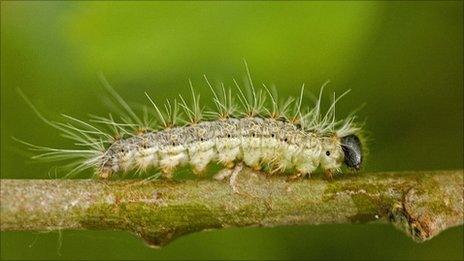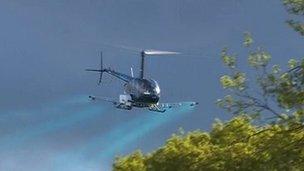Government body had 'concerns' over Pangbourne pesticide spray
- Published

The oak processionary moth caterpillar feeds on oak tree leaves
The government body that sanctioned the use of a controversial aerial pesticide over a Berkshire woodland had "quite serious concerns" about the method, it has been revealed.
A Freedom of Information request showed Natural England's worries about the method being used to kill off the larvae of a caterpillar.
However, it still permitted spraying to take place at two copses in Pangbourne using a helicopter.
A Forestry Commission spokesman said it was the "least damaging" way to tackle a larvae that "could be a serious problem to human and tree health".
The spraying took place at the Herridge and Broom Copses, both within a Site of Special Scientific Interest (SSSI), in an attempt to eradicate the oak processionary moth (OPM) larvae.
The caterpillar which feeds at the top of oak trees contains a toxin in its hairs that can cause itchy rashes, eye and throat irritations.
Natural England licensed the Forestry Commision (FC) to carry out the aerial spraying of the pesticide Bacillus thuringiensis (Bt) - the first of its kind in the UK.

The aerial spraying in Pangbourne was the first of its kind in the UK
But a Freedom of Information (FoI) request submitted by concerned Pangbourne resident Antoinette Earl showed Natural England believed the spray would have "a very significant impact" on other moths and butterflies in the area.
The body's briefing report also stated the method would not succeed in "eliminating OPM from this woodland".
Miss Earl has called the spraying an "act of environmental vandalism".
She added: "I decided to look into it further, and I was shocked to discover that Natural England was opposed to the spraying, but approved it, against the advice of its own expert scientists, knowing that the impact could be devastating to rare species and the wider food chain at this very sensitive site."
Natural England said in a statement that it did indeed have "concerns" that other species of moth and butterfly "may be impacted" but that "the effects on these populations would be short-lived and they would rapidly re-colonise".
It added that it granted consent on condition that a five-year monitoring programme of birds, moths, butterflies and bats would be carried out on the site, compared with other unsprayed woodlands in the area.
Miss Earl said she was concerned the pilot exercise would lead to aerial spraying elsewhere.
"OPM is a big issue in several London boroughs," she said, "and I worry that the Forestry Commission will use Pangbourne as the starting point for a much bigger spray operation there, with the potential for a massive impact on wildlife across a much wider area."
A Forestry Commission spokesman said of the OPM larvae that it "shared concerns about the potential impacts of the options for controlling it", but that it had "worked closely with scientists and regulators".
- Published8 June 2013
- Published5 June 2013
- Published15 May 2013
- Published7 May 2013
- Published18 May 2012
- Published1 May 2012
- Published27 January 2012
- Published18 April 2011